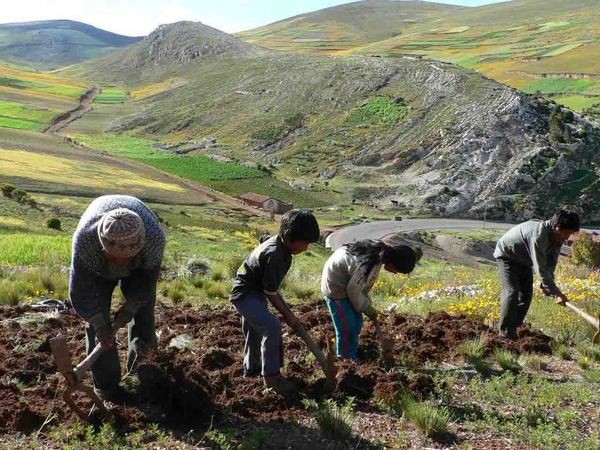The solution to climate change is in our lands
10/12/2014
- Opinión
 A global effort to give small farmers and indigenous communities control over lands is the best hope we have to deal with climate change and feed the world’s growing population.
A global effort to give small farmers and indigenous communities control over lands is the best hope we have to deal with climate change and feed the world’s growing population.As governments converge on Lima for the UN Climate Change Conference, the brutalkilling of Peruvian indigenous activist Edwin Chota and three other Ashaninka men this past September is shiningaspotlight on the connection between deforestation and indigenous land rights. The simple truth is plain to see: the most effective and just way to prevent deforestation and its impacts on the climate is to recognise and respect the sovereignty of indigenous peoples’ over their territories.
Peru’s violent land conflicts also bring into focus another issue of equal importance to climate change that can no longer be ignored: the concentration of farmland in the hands of a few.
Small farms of less than 5 hectares represent 78% of all farms in Peru, but occupy a mere 6% of the country’s agricultural lands. This disturbing figure mirrors the globalsituation. Worldwide, small farms account for 90% of all farms yet occupy less than a quarter of the agricultural land. This is bad news for the climate.
Just as the dispossession of indigenous peoples of their territories has opened the door to destructive, unsustainable resource extraction, the dispossession of peasants of their lands has laid the basis for an industrial food system that, amongst its many negative effects, is responsiblefor 44-57% of all global greenhouse gas emissions.
Food does not have to make such an overweight contribution to climate change. GRAIN estimates that a worldwide redistribution of lands to small farmers and indigenous communities, combined with policies to support local markets and cut the use of chemicals, canreduceglobalgreenhousegasemissionsbyhalf within a few decades and significantly curb deforestation. Simply by rebuilding the organic matter that has been depleted by decades of industrial agriculture, small farmers can put aquarteroftheexcesscarbondioxide that is now in the atmosphere back into the soil.
Giving lands back to small farmers and indigenous communities is also the most effective way to deal with the challenges of feeding a growing global population in an era of climate chaos. The available global data show that small farmers are moreefficient at producing food than big plantations. On the fraction of lands that they have held on to, small farmers and indigenous communities continue to produce mostoftheworld’sfood – 80% of the food in developing countries says the FAO. Even in Brazil, a powerhouse of industrial agriculture, small farms occupy a quarter of the farmlands but produce 87% of the country’s cassava, 69% of its beans, 59% of its pork, 58% of its cow milk, 50% of its chickens, 46% of its maize, 33.8% of its rice and 30% of its cattle.
The twin needs of feeding the world and cooling the planet can be met. But not if the governments meeting in Lima continue to ignore and violently repress the struggles of their peasants and indigenous peoples for land.
Photo by: Nya Reyes
https://www.alainet.org/pt/node/166079?language=en
Del mismo autor
- Souveraineté alimentaire et solidarité : un moment historique pour faire avancer nos luttes paysannes 16/04/2021
- "The Declaration on Peasants' Rights should become a political tool for Agrarian Reform and Social Justice" 17/04/2019
- “La Declaración de Derechos Campesinos debe ser una herramienta política para la Reforma Agraria y la justicia social” 17/04/2019
- Histórica victoria campesina 19/12/2018
- L'industrie des biotech tente de paralyser la Conférence de l'ONU sur la biodiversité, elle ne paralysera pas les paysans 06/12/2018
- The biotech industry is trying to block the UN Conference on Biodiversity, but it won't block farmers 06/12/2018
- La industria biotecnológica está tratando de paralizar la Conferencia de la ONU sobre Biodiversidad, ¡no paralizará a lxs agricultorxs! 06/12/2018
- Nations unies : la Troisième Commission approuve la Déclaration sur les droits des paysans et autres personnes travaillant dans les zones rurales 22/11/2018
- Naciones Unidas: El Tercer Comité aprueba la Declaración sobre Derechos Campesinxs y otras personas que trabajan en áreas rurales 21/11/2018
- Third Committee approves the UN Declaration on the Rights of Peasants and Other People Working in Rural Areas 20/11/2018
